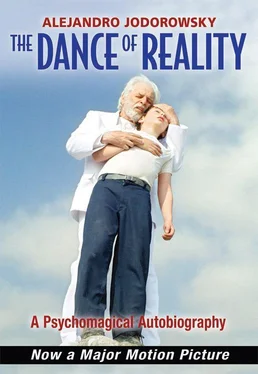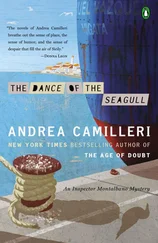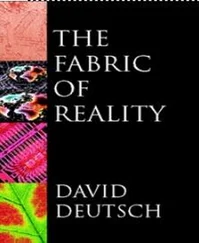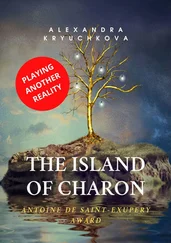Around the time of my nineteenth birthday there was a quarrel in my family that, despite its monstrosity, revealed another aspect of my creativity: up until that point I had worked with images and sensations, but had not explored a technique composed of objects and actions. It happened that every day, between one and three in the afternoon, my parents shut El Combate to come back to the apartment for lunch. Jaime would sit at the end of the table, facing away from the window (he had appropriated this location where the light from the sky fell on his back). Beside him, on his right, sat my sister. I was disdainfully granted a seat a little farther down the table, on the left side. My mother would sit at the other end, off on her emotional island, always eating with her eyes directed up toward the ceiling to express the disgust that my father’s noisy munching caused her. On this day, enervated by an accumulation of debts, Jaime devoured the food that was served by our faithful maid, sullying his lips and shirt more than was customary. Suddenly, Sara gave a low moan and murmured, “This man looks like a pig; it makes me want to throw up.”
On the wall behind my mother hung an oil painting by a commercial artist of the lowest caliber. It was the familiar Andean landscape, illuminated by the red light of a sunset. My mother liked it because her mother had suggested she buy it. My sister and I thought it was ridiculous. Jaime hated it because it had been expensive. Raquel and I were silent with terror upon hearing Sara’s unexpected words. Generally, in such cases, Jaime would get up and punch her in one of her pretty eyes. This time it was not so: he turned pale, slowly lifted his plate as a priest might lift a chalice, and threw his fried eggs at my mother’s head. She ducked, and they landed right on the painting. The two yolks stuck there in the middle of the sky like twin suns. And oh, what a revelation; for the first time this vulgar painting appeared beautiful to me! In one fell swoop, I had discovered surrealism! Later on, I had no trouble understanding the words of the futurist Marinetti: “Poetry is an act.”
Definitions are only approximations. Whatever the subject may be, its predicate is always the entirety of the universe. In this impermanent reality what we imagine as absolute truth becomes inconceivable to us. Our arrows will never hit the white center of the target, because it is infinite. The concepts used by reason are true for me, here, at this precise time. For someone else, in the same place later on, they may be false. For this reason, despite having been raised with the most tenacious atheism, between two beliefs I decided to choose the one that would be more useful or the one that would help me to live. Before coming into the world I was a form of will that chose who its father and mother should be in order that my spirit might develop through suffering and rebellion in contact with the mental boundaries of these two immigrants. Why was I born in Chile? I have not the least doubt: my encounter with poetry justifies my emergence in that country.
Chile was poetically alive like nowhere else in the world during the 1940s and early 1950s. Poetry permeated everything: education, politics, cultural life, love. At the continuous parties that took place every day, where people drank wine without limitation, there was always some drunk reciting the verses of Neruda, Gabriela Mistral, Vicente Huidobro, and other great poets. Why such lyrical joy? In those years, while humanity was suffering from the effects of World War II, far off Chile — separated from the rest of the planet by the Pacific Ocean and the Andes mountain range — observed the struggle between the Nazis and the Allies as if it were a soccer match. There was a map covered with little flag pins on the wall of every home; the ups and downs of the opposing armies were followed amidst innumerable toasts and bets. Despite its internal problems, for the Chileans their long and narrow country was like an island paradise, protected by distance from the world’s ills. While death prevailed in Europe, poetry reigned in Chile. With abundant food (four thousand kilometers of coastline provided delicious mollusks and fish) and an exceptional climate for producing cheap wine (a liter of red cost less than one of milk), the most important thing for all social classes, poor and rich alike, was partying. Most of the bureaucrats would behave themselves properly until six o’clock in the evening, but once they were out of the office they would get drunk and undergo a change, shedding their gray personalities and assuming a magical identity. (A respectable notary made people call him Terrible Black Tits when drinking in the bars after six o’clock, and the way he had dealt with one customer was the subject of much mirth: “Señora, I have also been a woman. Let us speak cow to cow.”) The whole country was seized by a collective madness at sunset. The lack of solidity in the world was celebrated. In Chile, the earth trembled every six days! The very soil was, as it were, convulsive. For this reason, all people were subject to existential tremors. We did not live in a solid world governed by a rational being, but in a trembling, ambiguous reality. We lived precariously, both on the material plane and in our relationships with one another. You never knew how a night out on the town would end: a couple married at noon might wake up the next morning in other people’s beds, the guests you invited over might throw your furniture out the window, and so on. Poets, night owls by necessity, lived to euphoric excess. Neruda, an obsessive collector, built a house-museum in the form of a castle, gathering a whole village around him. Huidobro was not content with writing “Why do you sing the rose, O poets! Make it blossom in the poem!” but also covered the floors of his house with fertile soil and planted a hundred rose bushes there. Teófilo Cid, the son of some extremely rich Lebanese, gave up his fortune, although he did keep his subscription to the French newspaper Le Monde, and, drunk day and night, began living on a bench in Forestal Park. He was found dead there one morning covered by sheets of that same newspaper. There was another poet who only appeared in public on the occasion of his friends’ funerals, in order to jump on the coffin. The exquisite Raúl de Veer did not bathe for two years in order to use his stench to identify those who were truly interested in hearing his verses. They had all begun to emerge from literature to participate in the events of daily life with an aesthetic and rebellious stance. For me, as for many other young people, they were idols showing us a beautiful and insane way to live.
In celebration of Jashe and Moishe’s golden wedding anniversary the family decided to throw a party, at the same time inaugurating the new house that Isidoro, the architect, had designed for his mother: a large casket from which another smaller casket rose up, balanced on a pair of columns. The event was attended by close relatives and by some distant ones who came from Argentina. Most of them were chubby retirees, and their dark skin contrasted with their white hair, which they wore proudly, full of viscous satisfaction at being part of this humdrum Sephardic family. Sara, between nervous laughter and sugary tears, went from one relative to another uttering exaggerated elegies motivated by her desire to be liked. Unfortunately, being the beautiful swan among so many ugly ducklings, she drew contempt from all. Particularly envious was Fanny, who let slip some cruel jokes about Sara’s weight and the whiteness of her skin, comparing her to a sack of flour. Jaime was also despised for having a store in a working class neighborhood. With great condescension he was invited to play cards, and conspiring among themselves they relieved him of a large sum of money.
Читать дальше












